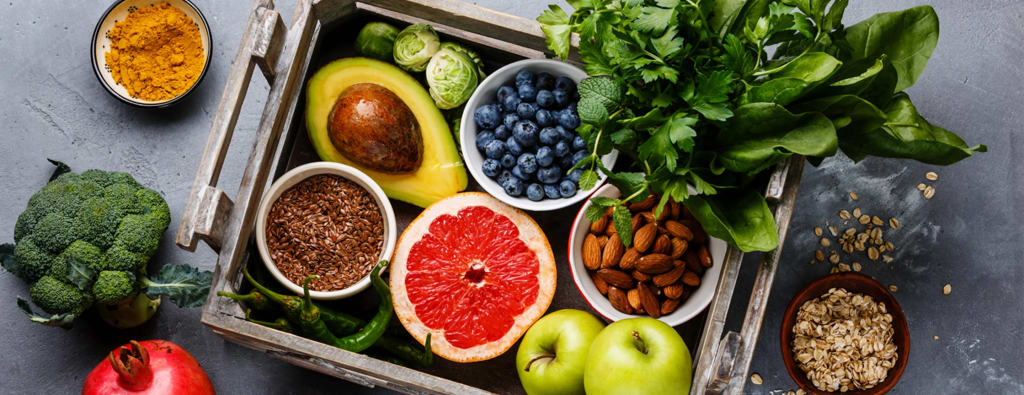Have you tried being more flexible?
The Benefits of A Flexitarian Diet

A plant-based diet can greatly improve your overall health and reduce the number of medications you are taking, as well as decrease the risk of other possible illnesses.
In a country where obesity is continually on the rise and heart disease is the leading cause of death in the United States, we often find ourselves scrambling for the next health fad and doctor-recommended dietary solution. While there are many to choose from, eating plant-based has become increasingly popular for good reason. A plant-based diet offers a shift in our eating habits and in our way of life, reaping the benefits all the way around: from expanding our minds to managing our weight, to needing fewer doctors’ orders, to reducing the number of medications we take. Once you see the results of medical research surrounding plant-based dieting, the findings are hard to ignore.
Plant-based is often confused with veganism, which is completely giving up meat and animal products of any form. However, this is not the case with plant-based—being plant-based is rooted in a diet practiced by “flexitarians.” A flexitarian is someone who eats primarily vegetarian but occasionally eats meat or fish. A plant-based diet focuses on vegetables, fruits, whole grains, legumes, nuts, and seeds, but greatly limits the intake of animal products and red meat. As a team of researchers from the Mayo Clinic found, what you don’t include in your diet can be just as important to your health as what you do consume. “Research shows that people who eat red meat are at an increased risk of death from heart disease, stroke or diabetes. Processed meats also increase the risk of death from these diseases. And what you don't eat can also harm your health. Diets low in nuts, seeds, seafood, fruits and vegetables also increase the risk of death.” (Mayo Clinic 2020) Therefore, it is important to make sure that at least two-thirds of your plate during each meal are plant-derived and provide the nutrients your body desperately needs.
Scientists have conducted multiple studies that have produced sufficient evidence to now urge the public to avoid eating an excessive amount of red meat, as it increasingly becomes a high risk for death and cardiovascular disease. To deter people from participating in a plant-based lifestyle, a common concern voiced is the fear of becoming protein deficient. This fear stems more from a lack of knowledge on what protein really is, or is not: protein does not equal meat. Philip J. Tuso (Regional Co-Lead for the Complete Care Program) and a team of medical doctors found that, “Generally, patients on a plant-based diet are not at risk for protein deficiency. Proteins are made up of amino acids, some of which, called essential amino acids, cannot be synthesized by the body and must be obtained from food. Essential amino acids are found in meat, dairy products, and eggs, as well as many plant-based foods, such as quinoa. Essential amino acids can also be obtained by eating certain combinations of plant-based foods. Examples include brown rice with beans, and hummus with whole wheat pita. Therefore, a well-balanced, plant-based diet will provide adequate amounts of essential amino acids and prevent protein deficiency.” (Tuso 2013) So, the overworked protein deficiency argument is farfetched, and only plausible in extreme cases of malnutrition or unbalanced dietary choices. In fact, many plant-based options are packed with protein that we can eat in abundance, and that would be equally beneficial for our health. For example, spirulina, in just 5 tablespoons, contains 20 grams of protein, and as it passes through our body, removes toxins and works as an anti-inflammatory. The health benefits of turkey were compared to those of pumpkin seeds in an article called “Meat vs. Plant Protein,” where Delfina Ure says, “When we compared pumpkin seeds to turkey meat we found that a mere handful contains more glutamate, zinc, and phytosterols than turkey. When considering just protein both are on par, but why not load up on the copper, manganese, phosphorous, vitamin K, E, and B while you’re at it. Pumpkin seeds are extremely more efficient to grow than turkey and much less harmful to the planet.” (Ure 2022) In the long run, choosing to eat less meat and substituting with legumes, vegetables, nuts, and grains could help to prolong our lives and keep us from seeing the doctor at a more frequent rate.
Fruits and vegetables supply natural antioxidants to our bodies that neutralize toxins, providing immunities we need to stay healthy and fight off infection. If you are not incorporating them into your diet, you are leaving room for disorders such as cancer or heart disease to run rampant without having any natural checks and balances put in place. The healthier the immune system, the more able it is to recognize and attack infected or mutated cells before they progress into a disease. “These natural antioxidants from plant materials are mainly polyphenols (phenolic acids, flavonoids, anthocyanins, lignans and stilbenes), carotenoids (xanthophylls and carotenes) and vitamins (vitamin E and C) [6,20]. Generally, these natural antioxidants, especially polyphenols and carotenoids, exhibit a wide range of biological effects, such as anti-inflammatory, antibacterial, antiviral, anti-aging, and anticancer” (National Library of Medicine 2017). It has become increasingly more common to take vitamins and supplements to meet our nutritional needs. Things like prebiotics and probiotics can make a positive difference in our gut health, but we should make sure every day to incorporate healthier, plant-based foods, that are easily accessible to us and full of natural medicines.
Science has proven that leaving your body in a state of prolonged inflammation can lead to cancer; this means that even being overweight can prove to be detrimental to our long-term health. Plant-based diets are known to help with weight management, which literally tips the scale in our favor in more ways than one. “This is because excess weight causes inflammation and hormonal imbalance. If you are overweight or obese, your risk is higher for 12 different types of cancer including colorectal, post-menopausal breast, uterine, esophageal, kidney and pancreatic cancers.” (Alexander 2019) Colorectal cancer can be especially dangerous, so eating a diet that is high in fiber will give you an extra layer of protection, allowing your gut health to flourish. Fiber lowers cholesterol and stabilizes blood sugar levels; it is derived naturally from fruits, vegetables, and whole grains, yet another reason why being plant-based is looking increasingly beneficial.
A pitfall could be our own personal eating habits. We could very well be plant-based and still choose to eat foods that mostly contain sugar and highly saturated fats, such as white rice, white bread, sweets, and fried foods. These foods will ultimately lead to the same results that eating red meat would—a body riddled with inflammation. By choosing the appropriate plant-based foods, and a healthy/balanced portion of protein at each meal, we can put our gut health into alignment and ensure that we are absorbing the nutrients we need to support our immune system, reduce inflammation, maintain a healthy weight, and fight off infections.
Another common concern keeping people from going plant-based is the misconception that soy products can cause breast and prostate cancer. Dr. Julia Brockway-Marchello, who is a medical oncologist with Memorial Sloan Kettering and other New York hospitals, “clears up the confusion by explaining that there are different types of estrogen. Our bodies make estrogen, a hormone, to keep our reproductive and other internal systems humming along. Estrogen can fuel certain cancers, like some breast cancers and prostate cancers. Our body’s estrogen is different from the type of estrogen found in soy.” (Brockway-Marchello 2022) Often, fitness trainers will push this idea that soy products are bad for us and you can only bulk up and get your protein intake through the consumption of meat. It is imperative to be mindfully aware of what information you are taking in and believing. Check your facts and check them again, with several sources, because everyone feels that the right idea is the one that they are selling, including doctors; thankfully, doctors have science to back them. Dr. Brockway-Marchello continues, “Soy is actually helpful for both preventing cancer and reducing its recurrence,” she says. “When we look at populations of people who have soy-based diets, we’ve seen lower rates of cancer, especially in breast cancer.” (Brockway-Marchello 2022)
Though the plant-based lifestyle is new in popularity, we are uncovering more benefits and busting misconceptions by the day. We must all carefully research, talk to trusted physicians, and make the best choices for our own health. Ultimately, I think we can agree that when it comes to sustainability and obtaining natural immunities, plant-based is the way to lean. No other diet can provide anti-aging, anti-viral, anti-cancer, anti-inflammatory, antioxidants, and a wide range of other biological benefits, all while managing our weight. If I haven’t convinced you to eat differently, I have certainly convinced myself!
Alexander, Heather. “5 Benefits of a Plant-Based Diet,” November 2019.
https://www.mdanderson.org/publications/focused-on-health/5-benefits-of-a-plant-based-diet.h20-1592991.html
Budhathoki, Sanjeev PhD; et al. “Association of Animal and Plant Protein Intake with All-Cause and Cause-Specific Mortality in a Japanese Cohort,” 26 August 2019.
https://jamanetwork.com/journals/jamainternalmedicine/fullarticle/2748453
Mayo Clinic Staff. “Meatless meals: The benefits of eating less meat,” 20 August 2020.
https://www.mayoclinic.org/healthy-lifestyle/nutrition-and-healthy-eating/in-depth/meatless-meals/art-20048193
Tuso, Philip J.; et al. “Nutritional update for physicians: plant-based diets,” 2013.
https://pubmed.ncbi.nlm.nih.gov/23704846/
National Library of Medicine. “Natural Antioxidants in Foods and Medicinal Plants: Extraction, Assessment and Resources,” 05 January 2017.
https://www.ncbi.nlm.nih.gov/pmc/articles/PMC5297730/#:~:text=These%20natural%20antioxidants%20from%20plant,)%20%5B6%2C20%5D
Ure, Delfina. “Meat vs. Plant Protein: 14 foods go head-to-head,” 2022.
https://www.muscleandfitness.com/nutrition/gain-mass/meat-vs-plant-14-protein-rich-foods-go-head-head/
Brockway-Marchello, Julia. “Does Eating Soy Increase Estrogen and Cause Breast Cancer?,” 27 July 2022.
https://www.mskcc.org/news/does-eating-soy-increase-estrogen-and-cause-breast
Manach, Claudine; et al. “Polyphenols: food sources and bioavailability,” May 2004.
https://pubmed.ncbi.nlm.nih.gov/15113710/
Baiano, Antonietta. “Antioxidant Compounds from Vegetable Matrices: Biosynthesis, Occurrence, and Extraction Systems,” 09 September 2016.
https://pubmed.ncbi.nlm.nih.gov/25751787/
About the Creator
Karina Mays
stay open — be brave — write it all out






Comments
There are no comments for this story
Be the first to respond and start the conversation.